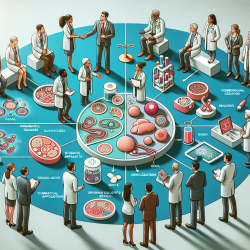Organoid research is a rapidly evolving field that offers significant potential for understanding human development, disease mechanisms, and therapeutic applications. However, the ethical implications and patient perspectives on this research are crucial for practitioners to consider. A recent study titled "Patients' perspectives on the derivation and use of organoids" provides valuable insights into how patients view organoid research and its implications.
The Importance of Patient Perspectives
The study conducted interviews with 60 patients or parents of pediatric patients from diverse disease populations. The findings revealed broad support for organoid development and use, emphasizing the importance of good intent, ethical oversight, and a robust consent process. This highlights the need for practitioners to engage with patients' views to ensure ethical compliance and enhance the therapeutic potential of organoid research.
Key Themes from the Study
- Broad Support for Organoids: Patients expressed enthusiasm for the potential of organoids to advance medical science and provide hope for future treatments.
- Moral Distinction of Brain Organoids: Brain organoids were seen as morally distinct due to concerns about sentience and personhood.
- Ethical Concerns: Some research poses moral concerns, particularly regarding brain organoids and commercialization.
- Need for Ethical Oversight: Patients emphasized the importance of ethical oversight and informed consent in organoid research.
Implications for Practitioners
For practitioners, understanding these patient perspectives is essential for several reasons:
- Enhancing Ethical Practices: By considering patient views, practitioners can ensure that their research aligns with ethical standards and addresses moral concerns.
- Improving Communication: Engaging with patients about the potential benefits and risks of organoid research can build trust and foster better communication.
- Guiding Policy Development: Patient insights can inform policy deliberations about appropriate organoid use, ensuring that regulations reflect public sentiment.
The Role of Practitioners in Advancing Organoid Research
Practitioners play a crucial role in advancing organoid research by integrating patient perspectives into their work. This involves not only adhering to ethical guidelines but also actively seeking patient input to guide research directions. By doing so, practitioners can contribute to the responsible development of organoid technologies that benefit both individual patients and society as a whole.
Encouraging Further Research
The study underscores the need for ongoing dialogue between researchers and patients. Practitioners are encouraged to conduct further research into patient perspectives across different demographics and disease groups. This will help ensure that organoid research continues to evolve in a way that is ethically sound and aligned with patient expectations.
To read the original research paper, please follow this link: Patients' perspectives on the derivation and use of organoids.










